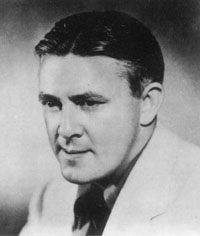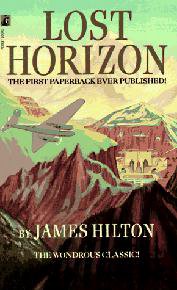The dumbing down of bestselling novels
Also in today's blog
The foundation of a rich and satisfying life
Fictional stately homes
Dictionary of National Celebrity
This week I've been re-reading two novels, both by men and both huge bestsellers in their day. They have confirmed my feeling that today's bestselling novelists are not a patch on their predecessors.

One of the novels is Lost Horizon by James Hilton, [1900-1954] first published in 1933. I had forgotten how good this book is, probably because when I read it for the first time there was more good fiction being published than there is today.
Searching the web for a photograph of the author, I learned that Camp David, where US presidents go to relax, was originally named Shangri-La, after the lamasery in the wilds of Tibet which was the main setting in
Hilton's novel, by President Roosevelt. President Eisenhower, who perhaps wasn't a bookish man, renamed it after his grandson.
There's some conflicting information about what inspired Lost Horizon. One source says that the book, awarded the Hawthornden Prize in 1934, resulted from Hilton's 1931 visit to a remote valley in North Pakistan, on its border with China, Afghanistan and Kashmir. He found a place so beautiful, so wild and so remote he called it Shangri-La, meaning "an earthly paradise".

It has also been suggested the book was inspired by the disappearance of George Mallory on Everest in 1924.
A book I hadn't known about before researching Hilton is The Heart of the World : A Journey to the Last Secret Place by Ian Baker. Published a year ago by Penguin, it sounds a must-read for anyone interested in wild places and ecology.
"The Tsangpo river cuts into the Himalayas to form the world's deepest chasm. At its heart, according to Buddhist texts, lies the fabled land of Shangri-La. Ian Baker was the first (and possibly last) westerner to explore this hidden realm, and to discover its extraordinary secret…Even in strict geographical terms the Tsangpo Gorge is unique. The Tsangpo river flows across the length of the Tibetan plateau until it plunges suddenly into a tangled knot of mountains and gorges at the eastern edge of the Himalayan range, forming a chasm three times the depth of the Grand Canyon."
James Hilton's private life did not match his professional success. He and his first wife divorced, but she returned to nurse him when liver cancer caused his early death.
The foundation of a rich and satisfying life
You may remember that, last week, I asked "…does the Times Literary Supplement offer me more food for thought than Arts & Letters Daily which is free?"
On my next visit to A&LD, my eye was caught by the following in the Essays and Opinion column.
"If a student doesn't know who, say, Jack Kerouac was, okay. We were all young and ignorant once. But what about young people who don't care that they don't know?"
This was followed by a link leading to an article headed "Lack of curiosity is curious" by a columnist whose backlist seems likely to provide many hours of good reading.

He is J Peder Zane, book review editor and columnist for the News & Observer since 1996. His column has won several national honours, including the Distinguished Writing Award for Commentary from the American Society of Newspaper Editors. He contributed to and edited the essay collection, Remarkable Reads: 34 Writers and Their Adventures in Reading.
The foundation of a rich and satisfying life
Here's an excerpt from his piece.
"A fundamental truth about people is that they are shaped by the world around them. In the here and now, get-the-job-done environment of modern America, the knowledge for knowledge's sake ethos that is the foundation of a liberal arts education -- and of a rich and satisfying life -- has been shoved to the margins.
It hasn't always been so. When my father, the son of Italian immigrants, was growing up in the 1930s and 40s, he aspired to be a man of learning. Forced to go to work instead of college, he read "the best books," listened to "the best music," learned which fork to use for his salad. He watched Fred Astaire puttin' on his top hat and tyin' up his white tie, and dreamed of entering that world of distinction.
That mind-set seems as dead as my beloved Dad. The notion of an aspirational culture, in which one endeavors to learn what is right, proper and important in order to make something more of himself, is past."
Fictional stately homes
As a former member of the Country Landowners' Association - whose stately home exists only in my own and my readers' imagations - I was interested to read the following in a recent issue of The Bookseller.

Burgh : The Heart's Citadal
Anita Burgh's novel from Orion is the second in a historical trilogy set in Devon in the early 20th century. Orion is marking publication with a lunch at the Bibury Court Hotel, the stately home that provided the inspiration for the book and is featured on its cover.
Anita Burgh tells me the prequel to her new book is The Broken Gate. Details at her website, another excellent example of the work of Artemis Designs.
Graphic novels
I once had one of my Mills & Boon romances published as a manga for Japanese readers. The pictures were well-drawn - except that the hero looked like a girl - and illustrated a greatly simplified version of my original text.
The issue of The Bookseller already mentioned was accompanied by a 24-page Graphic Novels supplement. Two articles in the supplement were by "genre expert" Paul Gravett who did his best to convince Bookseller readers that graphic novels - usually called comic books - are a good thing. He didn't succeed in convincing this reader.
However you dress them up, comic books appeal to people with poor reading skills or low IQs. If there's going to be a boom in them comparable to "the tsunami of translated manga" in the US, what it tells us is that education in Britain is continuing to decline.
Dictionary of National Celebrity
Don't miss D J Taylor's review of this book headed "Reassuring contempt Many of its targets may seem beyond parody, but satire can still survive in the age of celebrity".
Taylor writes
"…the satirist is faced with three disabling drawbacks. The first is that so many satirical targets, from John Prescott to Robbie Williams, are, as Craig Brown once despairingly put it, "beyond parody". The second, at a time when formal yardsticks of human behaviour are snapping all around us like celery stalks, is that many people, served up with something that labels itself "satire", are simply unaware that a joke is being made. Extraordinary as it may seem, a fair proportion of the populace probably imagines that reality TV is aspirational, or that Vanessa Feltz is a very interesting woman of whom a whole lot more should be heard."
